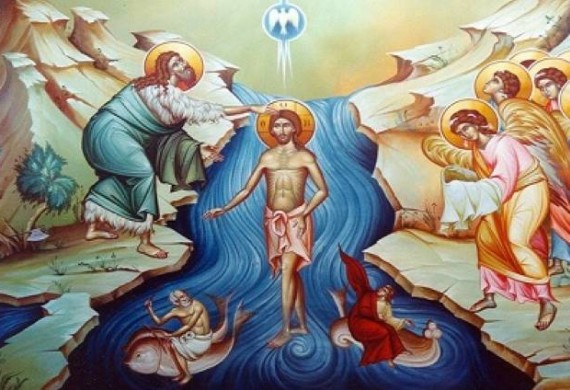Beloved brethren, our Holy Church closing this blessed period of Christmas feasts, in which we celebrate the revelation of our God to us, a) by the Incarnation of the Second Person of the Holy Trinity, our Lord Jesus Christ, b) with the Baptism of Christ when the Three Persons are manifested, wants to address to her children and to inform them about the Great Blessing of Waters, which is celebrated on the 5th and 6th January. Many are those who ask, if this blessed water is consumed, or is used for the sprinkling, or is kept at their homes and if it replaces Holy Communion.
1. The Blessing of Waters which is celebrated on Theophany’s Eve is the same as that of the following day.
The Small Blessing of Waters is celebrated at the beginning of each month, as well as in any other occasion, whenever the faithful request for it. Both are equal and sacred as they are sanctified by the same Holy Spirit.
2. The Great Blessing of Waters is kept throughout the year at the Church and is offered to the faithful on two occasions: 1) when one is ill, and 2) when one cannot receive Holy Communion, because he is under penitent.
The Great Blessing of Waters under no circumstances replaces Holy Communion, but is offered as comfort because they cannot receive Holy Communion and to stregenth them in their struggle for true repentance.
3. The Great Blessing of Waters is kept throughout the year at the Christians homes for their sanctification by sprinkling and partaking of it, as well as for the sanctification of their homes, gardens, crops, animals, automobiles, etc. It is used also for our protection from all evil and satanic forces. At home, we keep it at the Iconostasion (Icon corner), with a lit oil candle. This reminds us that we should avoid any type of sin, which alienates the Divine Grace.
4. Finally, we shall examine the relationship between the Great Blessing of Waters with that of the Small Blessing of Waters, as well as that of fasting.
We do not fast on the 5th January, the day before Theophany, in order to partake the following day (6th January), but we fast for the Great feast of Theophany!
Historically the beginning of the Great Blessing of Waters has as follows: In the ancient Church at the Eve of Theophany the baptism of the Catechumen, the newly Christians took place ( as during the eve of Easter and Pentecost). At midnight the blessing of the waters took place for the baptism. Then, as St. John Chrysostom informs us, the Christians partook of the blessed water and drank or they carried it to their homes for blessing and to keep it throughout the year. Later the service of the blessing of waters was separated from that of the Holy Sacrament of Baptism. The custom remained that the faithful to take from the blessed water for the sanctification of their homes. Very early it became a custom of fasting before the main feast of Theophany, because of two reasons:
A) First, because the two great feasts of Christmas and Theophany in the ancient Church were celebrated together, on the 6th January, but St. John Chrysostom (5th century) separated these two feasts and placed the Nativity of Christ on the 25th December, whereas the Baptism and manifestation of the Holy Trinity on the 6th January. Before each Depsotic Feast there is always a fasting period for the spiritual and bodily cleansings of the faithful. Thus, the Church placed fasting during the eve of Christmas and Theophany as a preparation for the celebration of the feasts and for receiving Holy Communion.
B) Secondly, it was an ancient tradition that those who were to be baptized to fast and with them the god-parents, the relatives and all those who willingly fast for those who were to be baptized. Thus, the tradition of partaking of the Blessed Water was joined with fasting.
For those who partake because they cannot receive Holy Communion, let them fast as they are instructed by their spiritual Father (Confessor-Pneumatikos). Finally, for those who partake occasionally from the Blessed Water kept at their homes, during illness or any danger, let them fast from every stain of body and soul, struggling for sanctification with fear of God.
Translated by:His Eminence Metropolitan Panteleimonof Antinoes

